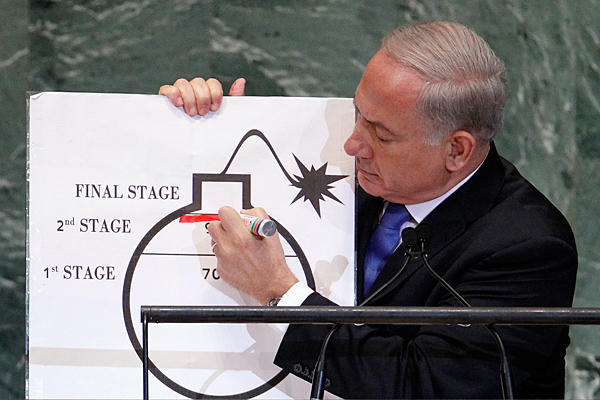November 01-2013

Israel’s chief of military intelligence says Iran under President Rohani is undergoing deep domestic changes, but no changes at all in its “nuclear vision.”
This interpretation appears in an analytical paper written in September by Maj. Gen. Aviv Kochavi, the head of Military Intelligence. The Israeli daily Haaretz reported on the paper Tuesday.
“Iran still seeks to reach the status of a nuclear threshold state,” in which it could manufacture a nuclear bomb fairly quickly if and when it decided to do so, wrote Kochavi, in his role as Israel’s “national intelligence assessor.”
He did not say Iran plans to build a bomb, but argued that Iran wants the ability to build as bomb quickly if it ever chooses to do so. This a view common among many analysts, but which only rarely makes it into the public print. It is also not the view Israeli Prime Minister Binyamin Netanyahu has expressed publicly.
Kochavi wrote that while there has been no change in Iran’s nuclear program since Rohani took office, there have been some real changes in Iran’s internal politics of a kind not seen in many years. Rohani’s victory sparked a process of deep change that cannot be ignored, Kochavi said, describing the changes as “significant” and even “strategic.”
In particular, Kochavi cited the increased strength of the moderate faction and the fact that 51 percent of the public voted for Rohani, who was an acceptable candidate but not the preferred candidate of Supreme Leader Ali Khamenehi.
Kochavi also based his analysis on the stated intention of Rohani and his cabinet to promote internal reform, increase the country’s openness to the West and end the economic sanctions on Iran.
Haaretz said two senior government officials familiar with Kochavi’s paper said it surveyed the situation in Iran since Rohani’s election from several standpoints – the internal political situation, the mood among the Iranian public, the regime’s nuclear policy, Iran’s involvement in terrorism and the Syrian civil war.
Prime Minister Netanyahu received Kochavi’s paper a few days before he left for the United States in late September. If he read it, the paper did not influence his public remarks about Iran.
In his UN address, Netan-yahu said there was no substantive difference between Rohani and either Khamenehi or former President Ahmadi-nejad, terming the new president a “wolf in sheep’s clothing.”
“Presidents of Iran have come and gone,” Netanyahu said. “Some presidents were considered moderates, others hard-liners. But they’ve all served that same unforgiving creed, that same unforgiving regime, that creed that is espoused and enforced by the real power in Iran, the dictator known as the Supreme Leader, first Ayatollah Khomeini and now Ayatollah Khamenehi. President Rohani, like the presidents who came before him, is a loyal servant of the regime.”
In an interview with BBC Persian the following day, Netanyahu said the Iranian people deserve better leadership. While Rohani “represents a desire for change,” he said, “I don’t think he has the mandate to change the real decisions that are made by Khamenehi.”
Two weeks later, in his speech at the opening of the Knesset’s winter session, Netanyahu did accept that “internal change” had taken place in Iran, but he ascribed it to international pressure on the country. Therefore, he said, “easing the pressure won’t strengthen the trend toward moderation in Iran, it will actually strengthen the uncompromising worldview of Iran’s true ruler, Ayatollah Khamenehi, and will be viewed as a significant victory for him.”























